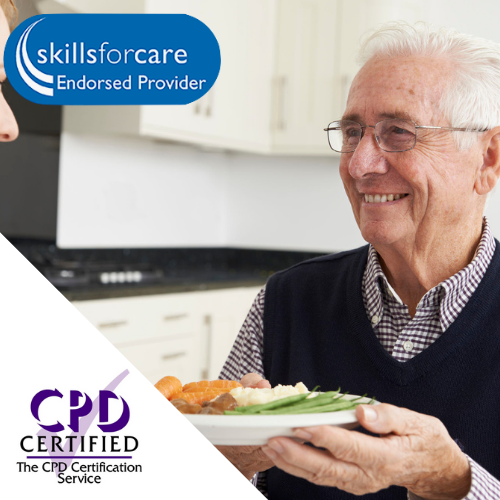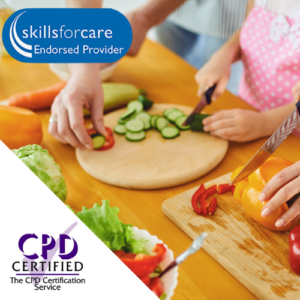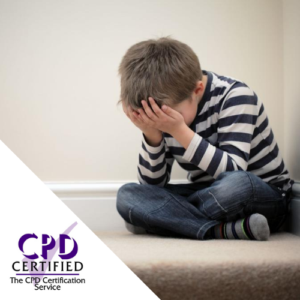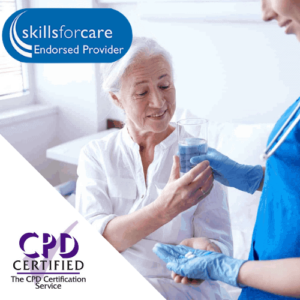Food Safety and Hygiene in Care
£24 + VAT
Our Food Safety and Hygiene in care course is suitable for anyone handling or preparing food in a care capacity. It is vital that people working in care have the up to date knowledge on food hygiene practices to ensure they do not put vulnerable people at risk of food poisoning or allergic reaction.
Get started immediately


Start immediately
Fully accredited
Immediate certificate
Guaranteed pass
All about this Food Safety and Hygiene in Care course
Our food safety and hygiene course is suitable for anyone preparing and handling food in a healthcare setting.
Preparing and handling food may appear to be a low-risk activity. However, it can result in illness if food safety is compromised through poor hygiene and unsafe practices, such as inadequate cooking.
The Food Safety Act 1990 (as amended) applies to all types of food businesses, including care providers. It provides a framework for all food legislation in Great Britain (England, Wales and Scotland).
You will learn about cross-contamination and that it happens when bacteria or other microorganisms are unintentionally transferred from one object to another. You will consider the three main ways cross-contamination can occur.
In this course you will learn that as a food handler, you have a legal duty to maintain high standard of personal hygiene and cleanliness, you will also consider that food hazards are often referred to as the 6Ps. These 6Ps are an easy way to remember the sources of contaminants that need to be controlled in your health and social care setting.
Having suitable premises for food preparation and handling is not optional. It is a legal requirement. You will learn about the regulations that lay down the general requirements for the layout, design and construction of all food premises.
Finally in our food safety and hygiene in care course, you will learn that all types of premises are attractive prospective homes for pests, as they have everything they require, e.g. shelter, moisture, food and warmth. Your employer should have an approved contractor to manage and monitor pest activity within and around the premises.
You will earn 3 CPD points on completion of the course, this course will take around 3 hours to complete and the certificate will last for two years.
- Fully CPD registered
- Course written by experts
- Suitable for people working with food in care
- Access your PDF certificate instantly on completion of the course
- Complete the online multiple choice assessments as many times as you need to pass
Units covered on this course
The introduction to food safety and law
In this first unit of our food safety and hygiene in care course, you will be introduced to food safety and will learn about why it is important in a health and social care setting. You will also look at why you need food hygiene training and some key terms relating to food safety. You will explore food safety legislation and some enforcement action available to local authorities if care providers do not comply. Finally, you will consider how HACCP and the Food Hygiene Rating Scheme can minimise the risks of food hazards in a health and social care setting.
Food hazards
In this unit, you will be introduced to food hazards. You will look at the four different types: microbiological, chemical, physical and allergenic. You will consider how food hazards can contaminate food and the harm they can cause. You will look at how to prevent and control contamination from the different types of food hazard. Finally, you will look at food allergies and why they can be dangerous. You will explore the 14 recognised food allergens and will learn how to comply with the law relating to allergen information.
Food poisoning
In this unit, you will be introduced to food poisoning and will learn why it is serious in a health and social care setting with vulnerable people. You will explore how food poisoning occurs and some of the common symptoms an infected person may experience. You will look at some examples of the microorganisms that can cause food poisoning and where they are found. You will consider some high-risk foods associated with food poisoning and will also learn about food spoilage. Finally, you will look at preventing food poisoning by following the 4Cs of hygiene and preserving food.
Food safety from delivery to service
In this unit, you will be introduced to preparing and storing food safely. You will look at food safety from delivery to storage and preparation to serving. You will learn about the importance of the danger zone and will look at the food safety precautions required for storage, cooking, hot holding, chilling and defrosting. You will consider what use-by dates and best-before dates are and the differences between them. You will also look at the importance of labelling and stock rotation.
Personal hygiene
In this unit, you will be introduced to what personal hygiene is and why it is important when preparing and handling food. You will look at the impact that poor personal hygiene can have in a health and social care setting. You will look at how to effectively wash your hands and some important hygiene rules to prevent contamination. Finally, you will consider fitness to work and what you and your employer should do if you have an illness that could affect food safety. You will look at what the 48-hour rule is and why it is important.
Premises and cleaning
In this last unit of our food safety and hygiene in care course, you will be introduced to the legal requirements surrounding the layout, design and construction of food premises. You will look at the general measures and hygiene practices necessary to ensure food safety as well as covering cleaning, which is one of the 4Cs of food hygiene. You will look at some key terms relating to cleaning and will learn about cleaning schedules. Finally, you will look at pests and some common types found around food areas.
Reviews for this Food Safety and Hygiene in Care course
Simple Training
Straightforward design - Work through our user-friendly courses without any hassle.
Accessible learning - Simple course sections which have clear voiceover included.
Login from anywhere - Access your course through our site on any device, from anywhere.

Immediate Certificates
Start immediately - Simply purchase your course and access everything right away.
Unlimited attempts - Work through your course as quickly as you like and have unlimited attempts at the quiz.
Certificates available instantly - As soon as you finish your final quiz, download your PDF certificate right away.

CPD certified
Established in 1996, the CPD certification Service work with a variety of colleges, universities and training providers to uphold quality provision in professional development. All of our courses are fully CPD Certified through the largest organisation for continuous professional development in the UK - the CPD Certification Service. This means that each course is thoroughly checked to meet exacting standards and ensures that CPD points are awarded upon completion.


Skills for Care endorsed
One of the most recognisable care brands in the UK, Skills for Care provides best practice guidance throughout the care sector. Skills for Care are renowned for strong leadership within the industry and carry out detailed research to ensure that care workers are able to continually reach high standards of practice.
Frequently Asked Questions
Learn more about this course and others that we offer. If you still have any questions, simply contact our course advisors on 0800 077 3063 or email hello@cpdonline.co.uk.
How long does it take to complete this course?
This course takes a few hours to complete and you can do this without any restrictions. This means you can buy the course and start at any time. You can also begin your learning, stop and come back to the course to pick up where you left off.
Is this Food Safety and Hygiene in Care course accredited?
Yes the course is fully accredited through the CPD Certification Service. They review all of our content to check for quality, depth and that the material is fully up-to-date. Each year our membership with the service is renewed and all courses are thoroughly checked prior to being accredited.
Will I get a certificate when I finish?
Yes, as soon as you finish this course, you can immediately download a PDF version of your personalised certificate.
How long does the certificate last?
The certificate after finishing this course lasts for 2 years until expiry which is when we recommend completing the training again. Some industries may require an update to CPD more frequently than this and others may not but, as a standard rule, we recommend completing the Food Safety and Hygiene in Care course every 2 years to ensure it is fresh in your mind and you understanding the latest regulations.
What are the benefits of studying this course online?
By completing this course online you can study in your own time and at your own pace. Having the ability to complete the units at a time to suit you engages your learning much more and enables you to interact and soak up the information easier.
Happy customers are what we're all about!
"From rolling out our new essential training package for staff up and down the country to assisting with ongoing training needs, the team at CPD Online have been responsive, efficient, and helpful every step of the way."
Dan King
Host Students
"Friendly, amenable staff who provide a prompt and efficient 5 star service, would definitely recommend this company."
Christina Conner
St John’s Hospice
"We have used CPD online for a while now, the courses are great and the cost is too! CPD helps us to ensure our employees are trained in specific areas, whilst giving the student the flexibility of learning at their own pace."
Rachel Priest
Kloeckner Metals
Other courses you might like

Food Labelling Regulations Training

Nutrition and Healthy Eating

HACCP Level 2

Child Neglect Awareness

Workplace First Aid

End of Life Care

Child Sexual Exploitation

Managing Behaviour that Challenges

ADHD Awareness

Administering Medication

Mental Capacity Act

Food Safety and Hygiene for Manufacturing Level 2













